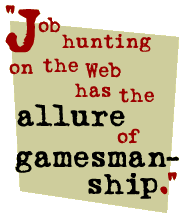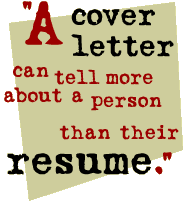Tripod Home | New | TriTeca | Work/Money | Politics/Community | Living/Travel | Planet T | Daily Scoop
|
WORK & MONEY
LET
THE
HUNT
BEGIN
Published July 1, 1996
Previous columns
|
I eased myself (psychologically, more than anything) into my current job hunt by browsing the various job sites on the Web, permanently posting an ASCII version of my resumé as well as sending it directly to certain job openings, hoping for at least an encouraging nibble. A month later, I have only bad news to report. Make that no news at all. Not a single reply out of 80 or so resumés sent out. I've had to step back and assess what I've done right in the past when I've succeeded in job hunting on the Internet -- and what I've done wrong so far in this job search. The only job I've landed off the Internet was that nightmare office manager job. I was poking around in the ECHO classfieds, a local BBS here in New York, and decided to post my resumé and ask if anyone could hook me up with an administrative job at a non-profit. The response was almost instantaneous and the rest is history. Membership really does have its privileges. The key to success in this instance was the fact that I conducted my search in a close-knit community where trust was established by mere virtue of being a member, sort of like asking your friends if they've heard of any job openings where they work. In this way, searching for a job on a local BBS or freenet is probably the closest you can get online to personal networking, one of the three avenues most HR people say you should pursue in looking for a new position, the other two being newspaper classifieds and, voilá, electronic networks. The only other success I've had is landing an interview with CNNfn based on a reply I sent to a posting in the journalism forum on CompuServe. Again, this seems to be similar to the ECHO situation, except that the CompuServe online community has closer to 3 million members as compared to ECHO's 3000. CNN was no doubt figuring that people who were checking out a professional forum were serious, experienced and committed. They were probably right. I don't know how many people CNN hired from responses to their CompuServe post; at least they had a talent pool to explore.
|

|
Then we have the wild and woolly Web, with dozens of sites listing, in many cases, thousands of jobs. Like anything else on the Web, the tool that separates the good from the mediocre is the use of search engines. Your use of search engines determines how close can you get to something you'd really want and how much time you waste sifting through the dross. Job hunting on the Web has the lure of
gamesmanship to it and it can be a lot of fun. It can also be a worthless
timesink if you end up at a lame site.
Here's a list of some of the better job sites I've encountered. But before going all click crazy on Harry's hot list, prepare yourself:
|

|
I have only begun to hunt and over the course of the next few weeks and months (man, I hope it's not more than that), I'll periodically report on the progress I've made and the inevitable pitfalls I've encountered. Just think of me as your job hunting guinea pig....
Harry Goldstein is a writer and editor living in Manhattan. His work has appeared in Utne Reader, American Book Review, Promethean, AltX, word.com, and other periodicals.
© 1996 Harry Goldstein, All Rights Reserved
|
Map | Search | Help | Send Us Comments

